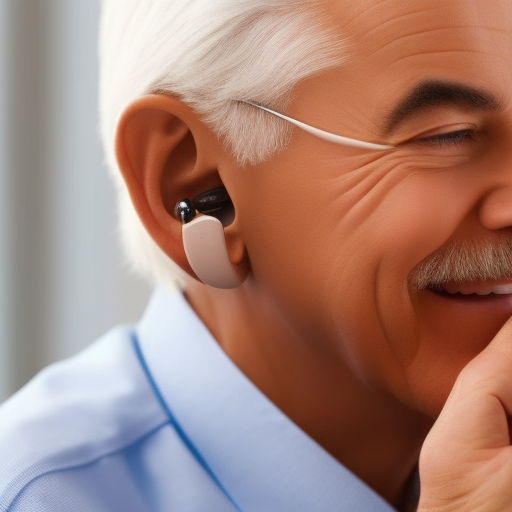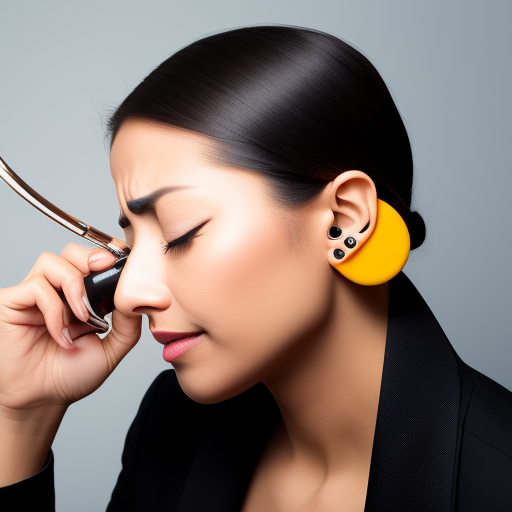How hearing loss can affect mental health and overall wellbeing
Hearing loss is a common condition that affects millions of people worldwide. It can occur at any age and can be caused by a variety of factors, including genetics, age, noise exposure, infections, and ototoxic drugs. There are several different types of hearing loss, including sensorineural, conductive, and mixed hearing loss. In this article, we will discuss how hearing loss can affect mental health and overall wellbeing and explore the various prevention, diagnosis, and treatment options available.


Can Ear Problems Cause Mental Problems?
Ear problems can indeed cause mental problems. When a person experiences hearing loss, it can lead to feelings of isolation and frustration. They may feel like they are missing out on important conversations, making it difficult to connect with others. This can lead to feelings of depression and anxiety, which can further exacerbate the problem. In some cases, untreated hearing loss can lead to cognitive decline, which can further impact mental health.
Does Hearing Loss Affect Quality of Life?
Hearing loss can have a significant impact on a person’s quality of life. It can make it difficult to communicate with others, leading to social isolation and feelings of loneliness. Additionally, it can make it challenging to perform daily tasks, such as answering the phone, watching television, or listening to music. This can lead to frustration and a reduced quality of life. Untreated hearing loss can also lead to cognitive decline, making it challenging to process information and remember details.
How Does Hearing Impairment Affect Emotional and Social Development?
Hearing impairment can significantly impact emotional and social development, particularly in children. Children with hearing loss may struggle with speech and language development, leading to difficulty communicating with others. This can make it difficult to form social connections, leading to feelings of isolation and low self-esteem. Additionally, children with hearing loss may be more likely to experience bullying, further exacerbating the problem. In adults, hearing loss can also lead to social isolation and difficulty communicating with others, leading to feelings of loneliness and frustration.
How Will Hearing Loss Affect a Person Emotionally, Socially, and Behaviorally?
Hearing loss can have a significant impact on a person emotionally, socially, and behaviorally. Emotionally, hearing loss can lead to feelings of depression, anxiety, and frustration. Socially, it can make it challenging to form and maintain relationships with others, leading to feelings of isolation and loneliness. Additionally, hearing loss can lead to communication barriers, making it difficult to participate in social activities and events. Behaviorally, hearing loss can lead to withdrawal from social situations, difficulty concentrating, and increased risk of accidents due to the inability to hear warning signals.
Types of Hearing Loss
There are several different types of hearing loss, each with its causes, symptoms, and treatment options. These include:
- Sensorineural Hearing Loss: Sensorineural hearing loss occurs when there is damage to the hair cells or nerve fibers in the inner ear. This type of hearing loss is typically permanent and can be caused by aging, genetics, noise exposure, infections, and other factors.
- Conductive Hearing Loss: Conductive hearing loss occurs when sound waves cannot travel through the outer or middle ear. This type of hearing loss can be caused by ear infections, earwax buildup, or damage to the eardrum or ossicles.
- Mixed Hearing Loss: Mixed hearing loss is a combination of sensorineural and conductive hearing loss. This type of hearing loss can occur when there is damage to both theinner ear and the middle or outer ear.
- Tinnitus: Tinnitus is a condition in which a person hears a ringing, buzzing, or other sound in their ear, even when there is no external sound present. This condition is often associated with hearing loss and can be caused by damage to the inner ear, exposure to loud noises, or certain medications.
- Presbycusis (Age-Related Hearing Loss): Presbycusis is a type of sensorineural hearing loss that occurs with age. It is a common condition and typically occurs in people over the age of 65. This type of hearing loss is caused by the natural aging process and can lead to difficulty hearing high-frequency sounds.
- Noise-Induced Hearing Loss: Noise-induced hearing loss occurs when a person is exposed to loud noises for an extended period. This type of hearing loss is often preventable and can be caused by exposure to loud music, machinery, or firearms.
- Ototoxicity: Ototoxicity is a condition in which certain medications or chemicals can damage the inner ear, leading to hearing loss. This type of hearing loss is often temporary but can be permanent in some cases.
- Otosclerosis: Otosclerosis is a condition in which abnormal bone growth in the middle ear can cause conductive hearing loss. This condition is often genetic and can be treated with surgery or hearing aids.
- Meniere’s Disease: Meniere’s disease is a condition that affects the inner ear and can lead to vertigo, tinnitus, and hearing loss. This condition is typically treated with medication and lifestyle changes.
- Acoustic Neuroma: Acoustic neuroma is a noncancerous tumor that can grow on the nerve that connects the inner ear to the brain. This condition can cause hearing loss, tinnitus, and balance problems.
- Auditory Processing Disorder: Auditory processing disorder is a condition in which the brain has difficulty processing sounds, even when there is no hearing loss present. This condition can lead to difficulty understanding speech, especially in noisy environments.
Diagnosis and Prevention of Hearing Loss
Diagnosing hearing loss typically involves a hearing test or audiogram, which measures the ability to hear different frequencies and volumes. If hearing loss is detected, the type and severity of the hearing loss can be determined, and treatment options can be discussed.
Preventing hearing loss is often possible, especially when it is caused by noise exposure. Wearing ear protection, reducing exposure to loud noises, and taking breaks from noisy environments can all help prevent noise-induced hearing loss. Avoiding ototoxic drugs and monitoring for signs of hearing loss can also help prevent further damage.
Treatment Options for Hearing Loss


There are several treatment options available for hearing loss, depending on the type and severity of the hearing loss. These include:
- Hearing Aids: Hearing aids are small devices that amplify sound and can help people with hearing loss hear better. They come in a variety of styles and can be customized to fit a person’s specific needs.
- Cochlear Implants: Cochlear implants are devices that are surgically implanted in the inner ear and can help people with severe hearing loss or deafness hear better. They work by bypassing the damaged part of the inner ear and directly stimulating the auditory nerve.
- Assistive Listening Devices: Assistive listening devices are devices that can help people with hearing loss hear better in specific situations, such as in noisy environments or on the phone. These devices include FM systems, captioning, and amplified phones.
- Speech Recognition: Speech recognition technology can help people with hearing loss understand speech better. This technology converts spoken words into text, which can be displayed on a screen or read aloud.
- Auditory Neuropathy Spectrum Disorder (ANSD): ANSD is a condition in which the auditory nerve does not transmit sound properly to the brain. This condition can cause difficulty understanding speech, even when there is no hearing loss present. Treatment options include hearing aids, cochlear implants, and auditory training.
- Central Auditory Processing Disorder: Central auditory processing disorder is a condition in which the brain has difficulty processing sounds, even when there is no hearing loss present. This condition can lead to difficulty understanding speech, especially in noisy environments. Treatment options include auditory training and assistive listening devices.
- Genetic Hearing Loss: Genetic hearing loss is caused by genetic factors and can be present at birth or develop later in life. Treatment options depend on the type and severity of the hearing loss and may include hearing aids, cochlear implants, or other assistive devices.
- Connexin 26: Connexin 26 is a genetic mutation that can cause hearing loss. This condition can be present at birth or develop later in life. Treatment options depend on the type and severity of the hearing loss and may include hearing aids, cochlear implants, or other assistive devices.
- Usher Syndrome: Usher syndrome is a genetic condition that can cause hearing loss and vision loss. This condition can be present at birth or develop later in life. Treatment options depend on the type and severity of the hearing loss and vision loss and may include hearing aids, cochlear implants, or other assistive devices.
Communication Barriers and the Impact on Quality of Life
Hearing loss can lead to communication barriers, which can have a significant impact on a person’s quality of life. Communication barriers can make it difficult to understand speech, participate in conversations, and socialize with others. This can lead to social isolation, depression, and anxiety.
In addition to communication barriers, hearing loss can also lead to safety concerns, especially in situations where hearing is important, such as when crossing the street or in emergency situations.
Impact of Hearing Loss on Emotional and Social Development
Hearing loss can also have a significant impact on emotional and social development, especially in children. Children with hearing loss may experience delays in language development, difficulty in socializing with peers, and lower academic achievement.
In addition, hearing loss can lead to low self-esteem and feelings of frustration and isolation, especially if the child is unable to communicate effectively with others.
Hearing loss is a common condition that can have a significant impact on a person’s quality of life. There are many different types of hearing loss, each with its own causes and treatment options. Diagnosing and treating hearing loss early is important to prevent further damage and improve communication and quality of life.
If you or someone you know is experiencing hearing loss, it is important to seek the help of a healthcare professional. With the right treatment and support, people with hearing loss can lead fulfilling and satisfying lives.
Here are natural medicine that can help you:
SonoVive — Every bottle is made here, in the USA, in our FDA approved and GMP certified facility, under sterile, strict and precise standards. The SonoVive dropper is natural and pure. You can rest assured that they do not contain any dangerous stimulants or toxins.

Quietum Plus —Tired of ear ringing and whooshing? Research shows tinnitus is linked to damaged signals from ear cells to the brain. Quietum Plus is a formula designed to regenerate and rebuild that damaged wire, backed by clinical studies and a combination of plants, medicine, and technology. Finally find relief from tinnitus symptoms and experience perfect hearing with Quietum Plus. Don’t let tinnitus control your life any longer — try it today.

Cortexi — Hearing, Tinnitus, Brain, Memory — Looking for a way to improve your hearing health? Look no further than Cortexi — the revolutionary formula that has already helped thousands of people around the world! Developed after years of dedicated research and testing, Cortexi is the perfect solution to give your ears the rest and support they need to thrive.

Comments
Post a Comment